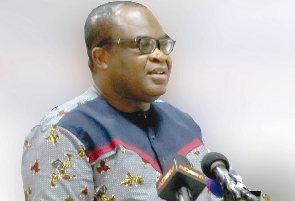 President of Association of OMCs, Kwaku Agyemang Duah
President of Association of OMCs, Kwaku Agyemang Duah
President of the Association of Oil Marketing Companies of Ghana (OMCs), Kwaku Agyemang Duah, says reports of a petroleum pricing cartel among oil marketers in the country are false.
Contrary to such claims, he said, stakeholders from other parts of the continent attest to the competitiveness of the Ghanaian downstream sector, considered to have the most competitive petroleum pricing regime in all of Africa.
In a media interview monitored by the Ghana News Agency, Mr Duah agreed that there are variances in the intermediate and lower tier group in the downstream sector, even though the upper tiers of the industry typically had the same petroleum pricing.
‘This is an extremely competitive market, and wherever I’ve visited, prices vary; people come here from other parts of Africa and say prices are quite dynamic, and there is variation in petroleum pricing,’ he said.
Analysts assert that the fact that the leading oil marketing companies had comparable fuel pricing regimes defeated the aim of the deregulation agenda.
Mr Duah stated that, despite the market’s high degree of competition, it still has faults, as many oil marketing firms are forced to close due to their inability to increase profit margins in reaction to inflation.
He criticized the fact that the industry’s stiff rivalry was forcing the volumes of the major oil marketing companies to decline.
Top-tier OMCs, according to Duncan Amoah, Executive-Secretary of the Chamber of Petroleum-Consumers, have varying overheads but offer the same prices across all pricing windows.
He contended that OMCs frequently participate in shadow pricing, in which they observe the going prices of other marketing businesses and charge the same amount.
Mr Amoah urged OMCs to stop quoting the same pricing and let the deregulation strategy take effect so that consumers would benefit.
He contended that OMCs frequently participate in shadow pricing, in which they observe the going prices of other marketing businesses and charge the same amount.
Abass Tansuti, Head of Economic Regulation at the National Petroleum Authority (NPA), said the Authority usually conducts market analysis to do their pricing estimates.
However, he stated that the NPA was hesitant to publicise the estimates since doing so might jeopardise the deregulation strategy.
Commenting on why top-tier OMCs charge the same price, Mr Tansuti noted that per the NPA’s investigation, they normally had the same overhead.
He said that the NPA had a system in place to deal with any collusion in the downstream sector.
The Ghanaian government initiated a deregulation policy in June 2015 to allow marketers and importers of petroleum products to sell directly to customers and set their own prices.